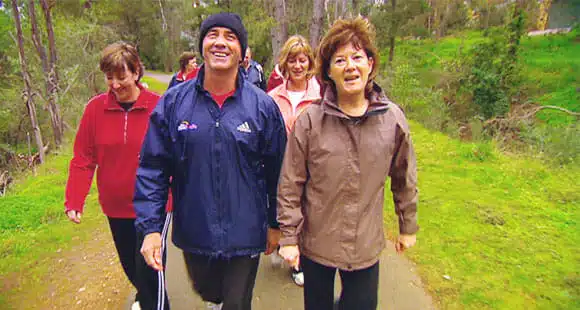The Importance Of Good Mental Health As We Age

As you age, it’s natural to start thinking about your health.
And while physical health tends to take the forefront of people’s attention, taking care of your mental health is just as important.
Depression and anxiety in particular, are surprisingly common conditions among older generations.
According to Age UK, over half a million people (579,803) aged 65 or over experience anxiety disorder and just under half a million (487,100) experience a major depressive disorder.
If you’re approaching this age group, or know someone who is, it’s worth educating yourself on how to take care of your mental health as you grow older. Here are some pointers.
Keep physically active
It’s repeated time and time again – and for good reason too – but staying physically active can do wonders for both your physical and mental health, particularly for those of the older generation.
Physical activity, in all ages, can provide long-lasting benefits to mental wellness by promoting the release of endorphins, thus reducing anxiety and stress and enhancing mood and self-esteem.
What’s more, by looking after your physical health you will simultaneously be nurturing the cognitive functions of your brain.
That helps in fostering better sleep patterns and ultimately provides a constructing outlet for managing thoughts and emotions that may influence your overall mental well-being.
This doesn’t have to mean intensive exercise, however.
Simply ensuring that you are keeping yourself active is enough and there are plenty of ways to do so without putting unnecessary strain on your body.
Tai chi, yoga (including chair yoga), cycling, swimming and water aerobics are all great choices if you’re after a moderate-intensity, low-impact activity.
Walking and gardening, or even lighter activities such as moving around the home, standing up and making the bed can help to keep your muscles active in different ways. The NHS has a full list of recommendations to choose from.

Engage in regular mental stimulation
Keeping your mind mentally stimulated regularly is also just as important as physical activity. So much so, that experts believe that such interests can help to keep the likes of dementia and Alzheimers at bay.
Engaging your mind with interests such as reading, puzzles, sketching, or even learning a new language is just like a physical workout for your brain as it promotes neuroplasticity and strengthens neural connections.
Similarly to exercise, the results have a lasting effect of sharper cognitive function, enhanced memory and problem-solving abilities, and a reduced risk of cognitive decline.
At the same time, allowing your mind to rest is equally important.
Finding time in the day to meditate or even just sit and relax can have many beneficial qualities.
This could be spending 20 minutes in the afternoon sitting and focusing on your breathing, or dedicating time before you go to bed to rest your mind with quiet meditation.
What’s more, regular meditation practice can improve focus and attention whilst reducing stress and anxieties as well as improve memory, which as you get older, can be extremely beneficial to your quality of life
Get enough sleep
Sleep is key to allowing your body and mind to rest and restore itself.
Lack of quality sleep can disrupt essential brain functions such as mood regulation, cognitive processes, and emotional resilience and a continued pattern of poor sleep can contribute to a higher risk of developing mental disorders such as depression and anxiety.
You can help to promote your natural sleep cycle by creating a healthy evening routine with minimal screen time and doing activities that you find relaxing.
You can listen to music, read a good book or even run yourself a bath to help you ease into the right mindset.
A good and consistent bedtime routine can substantially impact your sleep quality and greatly benefit your mental health in the long run.
It’s also important to know that sleep problems are a common issue, especially among older individuals.
If you find that you are struggling with quality sleep, seek advice from your pharmacist or GP.
This way you can receive advice and recommendations for products from experts in medicine and the pharmaceutical industry to ensure that you get the restful sleep that your body deserves.
Maintain social connections
Feelings of loneliness and isolation can be a common emotion for individuals in their later years which, if ignored can cause rapid mental health deterioration.
Social engagement is vital for combatting feelings of loneliness and can provide excellent opportunities for mental stimulation, emotional support and even coping mechanisms.
Take care to maintain good connections whilst also remaining open up to new ones .
Be on the look for local activity groups where you can meet and socialise with like-minded people, arrange regular meet-ups with friends and families, or even pick up the phone for a catch-up.
This will ensure that you keep a good circle of those you can rely on, even if the circle feels a little smaller than it once was.
Socialising can boost your mood, helping you feel more fulfilled while promoting a sense of belonging.
It’s also been suggested that it can help reduce your risk of dementia, as it’s a form of stimulation for the brain.
Seek support if needed
Sometimes, you might need support from a professional – and that’s ok.
Whether you’re coping with bereavement or you want to talk to someone about your anxiety, there are plenty of charities and helplines you can contact, as well as your local medical facilities.
There’s no shame in reaching out for extra help if you need it.
Dedicated mental health and elderly person charities, from Mind to Age UK have endless resources on their website to help you seek the support you need.
Celebrate the milestones and cultural icons turning fifty, reflecting on the passage of time and the enduring significance of these phenomena. Explore the profound connection between aging, memories, and mental well-being on LifeOver50
To conclude…
If you’re wondering how to boost your mental health as you approach old age, remember that plenty of resources are available to you, both in a medical and social sense.
The simple acts that form a healthy routine can be life-changing and help to prolong your mental health more than you might expect.





